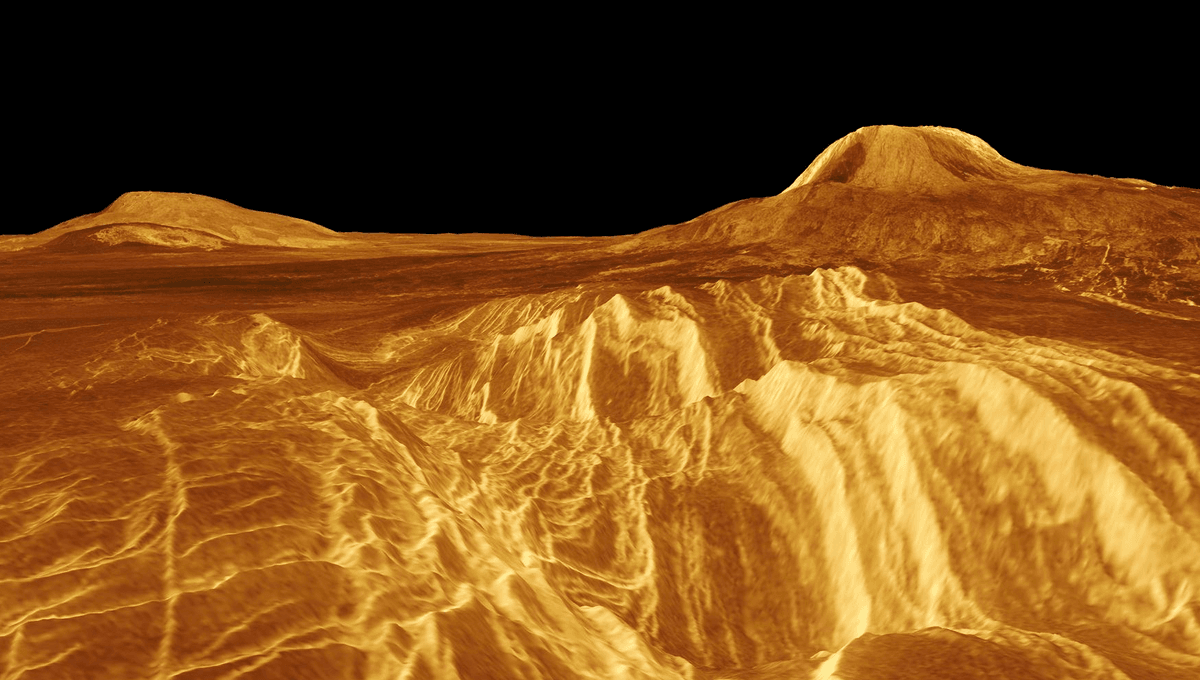
In among the seething mass of carbon dioxide that is the Venusian atmosphere, there is not enough water vapor to make plausible the wet history that has been imagined, new research indicates. If verified, the work would suggest searching Venus for signs of lost oceans is a waste of time. It may also cause us to question whether studies of planets warmer than Earth around other stars should also be deprioritized.
Science fiction writers noted Venus’s clouds and imagined a world of oceans and swamps beneath – unpleasant perhaps, but livable. When spacecraft revealed temperatures hot enough to melt lead, not everyone gave up; some concluded we were simply too late, but that Venus was once like that. Indeed, some argue, 4 billion years ago the planet one spot in from us was as amenable to life as Earth. In that case, similar worlds at an earlier stage of development might be the best targets for our telescopes.
Alas no, three Cambridge University scientists conclude. If that were true, a runaway greenhouse effect might make Venus unbearably hot, but it should be more of a steam bath than the hyper-Atacama missions have revealed.
The trio are not the first to think this. For a while, two versions of Venusian history have been battling it out. In one, Venus is a cautionary tale, a once hospitable planet ruined by a run-away Greenhouse effect, albeit a natural one rather than the product of a polluting civilization. In the other, it has always been hot and dry.
Arguments have been presented for each. The high concentration of deuterium on Venus has made some scientists think the planet once had plenty of hydrogen, that has since escaped, and this could have formed oceans hundreds of meters deep, but other explanations have been presented.
PhD student Tereza Constantinou hoped a new angle would break the deadlock. “Both of those theories are based on climate models, but we wanted to take a different approach based on observations of Venus’ current atmospheric chemistry,” Constantinou said in a statement. “To keep the Venusian atmosphere stable, then any chemicals being removed from the atmosphere should also be getting restored to it, since the planet’s interior and exterior are in constant chemical communication with one another.”
Although we think of Earthly volcanoes as mostly spewing out ash, carbon dioxide, and sulfurous gasses, their dominant product is actually steam. It’s just that’s not so noticeable when entering an atmosphere already laden with water vapor. If Venus has even a fraction of the water within its interior as Earth, some of that should escape through the volcanic activity we’re almost certain is ongoing.
Conditions within the Venusian atmosphere are not conducive to the long-term survival of water molecules, even as a gas. Nevertheless, if Venus’ volcanoes are producing as much water vapor as they are carbon dioxide and carbonyl sulfide, it should represent a substantial portion of the atmosphere.
Based on observations from our probes and the expected lifespan of different gasses, Constantinou and co-authors think Venus’s volcanoes must be spewing forth no more than 6 percent water. That would mean an interior with a great deal less water than Earth’s mantle, which in turn means any water Venus started with escaped very early on.
“We won’t know for sure whether Venus can or did support life until we send probes at the end of this decade,” Constantinou said. “But given it likely never had oceans, it is hard to imagine Venus ever having supported Earth-like life, which requires liquid water.”
The authors attribute the water loss to the slow cooling of Venus’s original surface magma, giving more time for water to escape. If so, that might have been driven by some distinctive Venusian reason, but more likely reflects factors common to planets at what we currently consider the inside edge of the habitable zone.
That would shape our search for life over the next few decades. “If Venus was habitable in the past, it would mean other planets we have already found might also be habitable,” said Constantinou. However, as she noted, our current telescopes, and those in the planning stages, work best on planets closer to their star than Earth is, and this is where we plan to focus their attention. “But if Venus was never habitable, then it makes Venus-like planets elsewhere less likely candidates for habitable conditions or life,” Constantinou added.
“We would have loved to find that Venus was once a planet much closer to our own, so it’s kind of sad in a way to find out that it wasn’t,” Constantinou said. “But ultimately it’s more useful to focus the search on planets that are mostly likely to be able to support life – at least life as we know it.”
The study is published in Nature Astronomy.
Source Link: Venus Probably Never Had Oceans – It May Always Have Been Hell